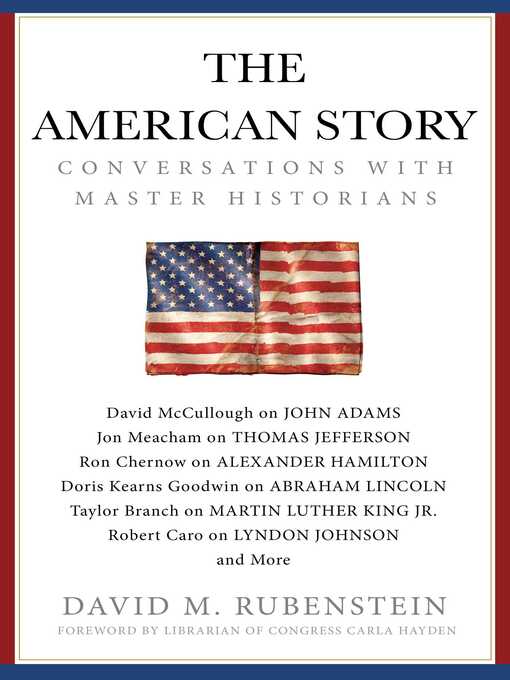
The American Story
Conversations with Master Historians
کتاب های مرتبط
- اطلاعات
- نقد و بررسی
- دیدگاه کاربران
نقد و بررسی

September 1, 2019
Interviews with 15 major American historians and the current chief justice of the Supreme Court. Since 2013, financier and philanthropist Rubenstein, co-founder of the private equity firm the Carlyle Group, has corralled the heavy hitters of American history for conversations held in the Library of Congress, intended for the edification of our elected representatives. His admirable goal has been to provide "information about the great leaders and events of our country's past, with the hope that...bringing the members together in a neutral, nonpartisan setting might modestly contribute toward reducing the seemingly increasing partisan rancor that has become so commonplace in Washington." That aim has flopped, but the text, accompanied by a generous selection of archival images from the LOC, provides a smooth education in American history, with an emphasis on presidents. Eschewing controversy and avoiding penetrating insights, Rubenstein asks leading questions; his responders, all veterans of the lecture hall or book tour, lay out the facts and their expert interpretations. According to Jack D. Warren Jr., George Washington was America's essential man. David McCullough joins the chorus supporting John Adams' rising reputation. Though Thomas Jefferson's continues its decline, Jon Meachem finds much to praise. Women are underrepresented, but Cokie Roberts has good things to say about Abigail Adams, Dolley Madison, and others. The longest biographies--Robert Caro's five volumes on Lyndon Johnson and Taylor Branch's three on Martin Luther King Jr.--are already classics only partly because of their literary brilliance. LBJ's support of the Civil Rights Act was perhaps the most courageous political act of the century because he did it with full knowledge that it would inflict permanent damage on his party. MLK and his allies were certainly heroes of their time, but the villains he faced make a more vivid impression. Other contributors include H.W. Brands, Bob Woodward, and Doris Kearns Goodwin. Breaks no new ground but provides an excellent introduction to leading historians and the books every engaged American should read.
COPYRIGHT(2019) Kirkus Reviews, ALL RIGHTS RESERVED.

September 16, 2019
Philanthropist and Bloomberg TV host Rubenstein debuts with a collection of 16 interviews he’s conducted as part of the Congressional Dialogues, a series of dinners held at the Library of Congress in which historians and biographers discuss their subjects in front of an audience of lawmakers. The interviews include such heavy hitters as Ron Chernow on Alexander Hamilton, Robert Caro on Lyndon B. Johnson, Doris Kearns Goodwin on Abraham Lincoln, and Taylor Branch on Martin Luther King Jr. and the civil rights movement. The best discussions are fascinating and surprisingly funny, as when A. Scott Berg relates the moment that he discovered how Charles Lindbergh relieved himself during his transatlantic flight: in a paper cup. Rubinstein elicits unexpected biographical nuggets, including the fact that Martin Luther King Jr.’s name was changed from Michael when he was five years old, after his father visited Protestant reformer Martin Luther’s birthplace. Broader ranging conversations, however, such as Jay Winik on FDR, can feel a bit disjointed and in need of tighter editing. The homogenous roster of interviewees and historical subjects, however, underrepresents women (only Goodwin, Cokie Roberts, and the “Founding Mothers” are featured) and people of color. The result is a well-intentioned and mostly engaging collection that suffers for its lack of inclusivity.

October 1, 2019
This revealing collection brings together 16 interviews originally given as part of the series of Congressional Dialogues that philanthropist and radio host Rubenstein organized for members of Congress, beginning in 2013. Held at the Library of Congress, the Dialogues were intended to give Congress historical perspective that might inform their thinking about leadership and public service. In the interviews herein, historians such as Doris Kearns Goodwin, Ron Chernow, and Bob Woodward discuss ten presidents from George Washington to Ronald Reagan, along with figures such as Benjamin Franklin, Alexander Hamilton, Charles Lindbergh, and Martin Luther King Jr., in most cases admiring their subjects, though they do note their failings and foibles. What emerges is a story of triumph and seeming divine destiny, with occasional mentions of the contradictions of slavery and freedom, poverty and progress, might and right. VERDICT We do not know what members of Congress took away from the Dialogues, but readers of this book will learn much about biographical method, historical curiosity, and American exceptionalism. With close reading they will also realize that there is no one American story, Rubenstein's claim notwithstanding.--Randall M. Miller, St. Joseph's Univ., Philadelphia
Copyright 2019 Library Journal, LLC Used with permission.

























دیدگاه کاربران